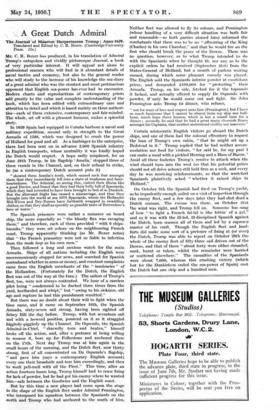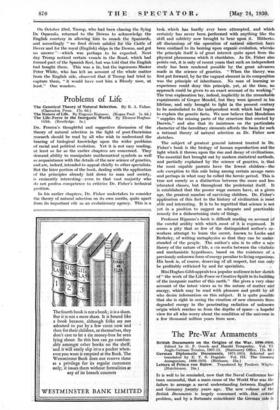A Great Dutch Admiral
Mn. C. R. Boxer has produced, in his translation of Admiral Tramp's outspoken and vividly picturesque Journal, a book of very- particular interest. It will appeal not alone to professional seamen who will find in it abundant details of naval tactics and economy, but also to the general reader who will study to the increase of his knowledge the sea-diary of a great admiral who was the stoutest and most pertinacious opponent that English sea-power has ever had to encounter. Modern charts and reproductions of contemporary prints add greatly to: the value and complete understanding of the book, which has been edited with extraordinary care and attention to detail and which is based mainly on three authori- ties—each of them extensive, contemporary and fair-minded. The whole, set off with a pleasant humour, makes a splendid story.
In 1639 Spain had equipped in Corufia harbour a naval and military -expedition, second only in strength to the Great Armada of 1588, which was designed to crush the power of Holland for good and all. As a harbinger to the enterprise, there had been -sent on in advance 2,000 Spanish infantry in English transports, whose neutrality it was fondly hoped the Dutch would respect. A hope sadly misplaced, for on June 28th Tromp, in his -flagship 'Amelia,' stopped three of these vessels in the Channel, and, on their refusal to strike, he (as a contemporary Dutch account puts it)
" showed them Amelia's teeth, which caused such fear amongst them that they immediately fell into a state of weakness and faint- heartedness. The Admiral, on seeing this, visited their illness like a good Doctor, and found that they had their belly full of Spaniards, which they had intended to have been brought to bed of in Dunkirk. But the .aforesaid fright has caused a miscarriage, and thus they brought into the world at sea 1070 Spaniards, whom the Hollander Mid-Wives and Dry-Nurses have forthwith wrapped in swaddling clothes, so that they shall as speedily as possible taste of Rotterdam's beer or water."
The Spanish prisoners were rather a nuisance on board ship, the more especially as " the bloody flux was ravaging them," and therefore, each of them provided " with 6 ships- biscuits," they were set ashore on the neighbouring French coast, Tromp- apparently thinking (as Mr. Boxer notes) that " the French peasantry were not so liable to infection from the roode loop as his own men."
Then followed a long and anxious watch for the main Armada. Ships of all nations including the English were unceremoniously stopped for news, and searched for Spanish contraband whether in arms or money, and constant complaints came from the English merchants of the " insolencies " of the Hollanders. (Fortunately for the Dutch, the English fleet was out of the way at the time.) The sailors of Tromp's fleet, too, were not always contented. We hear of a careless pilot being " condemned to be ducked three times from the yard, keelhauled and whipt," but " owing to his sickness, old age and rupture he had this punishment remitted."
But there was no doubt about their will to fight when the time came, and it came on September 16th, the Spanish Armada, sixty-seven sail strong, having been sighted off .Selsey Bill the day before.. Tromp, with but seventeen sail and with a leeward position, pounced on it as it straggled higgledy-piggledy up the Channel. De Oquendo, the Spanish Admiral-in-Chief, " shrewdly torn and beaten," himself broke off the action, and, after 'a pretence at being willing to resume it, bore up for Folkestone and anchored there on the 17th. Next day Tromp was at him again in the small hours of the morning, and the Dutch fleet, now thirty strong, first of all concentrated on De Oquendo's flagship, " and gave him (says a contemporary English account) every one their broadside and tore him exceedingly, and then to work pell-mell with all the Fleet." This time, after an action fourteen hours long, Tromp himself had to cease firing for lack of powder, but he had got his enemy where he wanted him—safe between the Goodwins and the English coast.
But by this time a new player had come upon the stage in the shape of the English fleet under Admiral Pennington, who interposed his squadron between the Spaniards on the north and Tromp who had anchored to the south of him. Neither fleet was allowed to fly its colours, and Pennington (whose handling of a very difficult situation was both fair and reasonable—so both parties abused him) informed the combatants that there was to be no " affronting of the King (Charles) in his own Chamber," and that he would fire on the first who should break the peace of the Downs. There was no question, however, as to what Tromp intended to do with the Spaniards when he thought fit, nor any as to the explicit orders he had received (September 21st) from the States-General of Holland, but a month of parlous waiting ensued, during which some pleasant comedy was played. The English sold the Spaniards inferior powder at exorbitant prices, and demanded £100,000 for " protecting " their Armada. Tromp, on his side, fetched for it the topmasts it lacked, and actually offered to supply De Oquendo with powder, if "-only laS would come out and fight. Sir John Pennington asks Tromp the dinner, who refuses,
" not for want of love and respect unto him (Pennington), but I have so much businesse that I cannot be absent from my ship one half- hour, much lease three homes, which is but a usuall time for a dinner ; secondly he said that he had a great many clownish Boars amongst his Captains, that neither understood civility nor manners."
Certain aristocratic English visitors go aboard the Dutch ships, and one of them had the colossal effrontery to request the loan of Tromp's own cabin, " that he might set up a Bedstead in it." Tromp replied that he had neither accom- modation nor food for visitors, " for said he, for my part I can make a meal with a pickled Herring and a Ham of Bacon." Amid all these fooleries Tromp's resolve to attack when the wind should turn into the west (so that his potential prizes should not all drive ashore) still held firm as a rock, and every day he was receiving reinforcements, so that the wretched Spaniards plaintively asked " whether it rained ships In Holland."
On October 9th the Spanish had fired on Tromp's yacht, as he impudently enough sailed on a visit of inspection through the enemy fleet, and a few days later they had shot dead 'a Dutch seaman. The excuse was there, on October 21st the wind was right, and Tromp fell on. Someone has sung of how " to fight a French fal-lal is like hittin' of a gal," and so it was with the ill-led, ill-disciplined Spanish against the Dutch, born seamen all of them and led by a supreme master of his craft. Though the English fleet and land- forts did make some sort of a pretence of firing at (or over) the Dutch, Tromp was able to report on October 29th the whole of the enemy fleet of fifty-three sail driven out of the Downs, and that of these " about forty were either stranded, sunk, burnt or taken, whilst the remainder were harried or scattered elsewhere." The casualties of the Spaniards were about 7,000, whereas this crushing victory (which but for the Dunkirkers ended the sea-power of Spain) cost the Dutch but one ship and a hundred men.
On October 23rd, Tromp, who had been chasing the flying De Oquendo, returned to the Downs to acknowledge the English _courtesy in allowing him to smash the Spaniards, and accordingly " we fired divers saluteS for the Castle of Dover and for the royal (English) ships in the Downs, and got no answer "—which was perhaps to be expected. Next day TrOmp noticed certain vessels in the Road, which had formed part of the Spanish fleet, but was told that the English had bought them. This was a lie, but the ingenuous Master Peter White, who has left an account of the whole matter from the English side, observed that if Tromp had tried to capture them, " it would have cost him a Bloody nose, at least." One wonders.







































 Previous page
Previous page